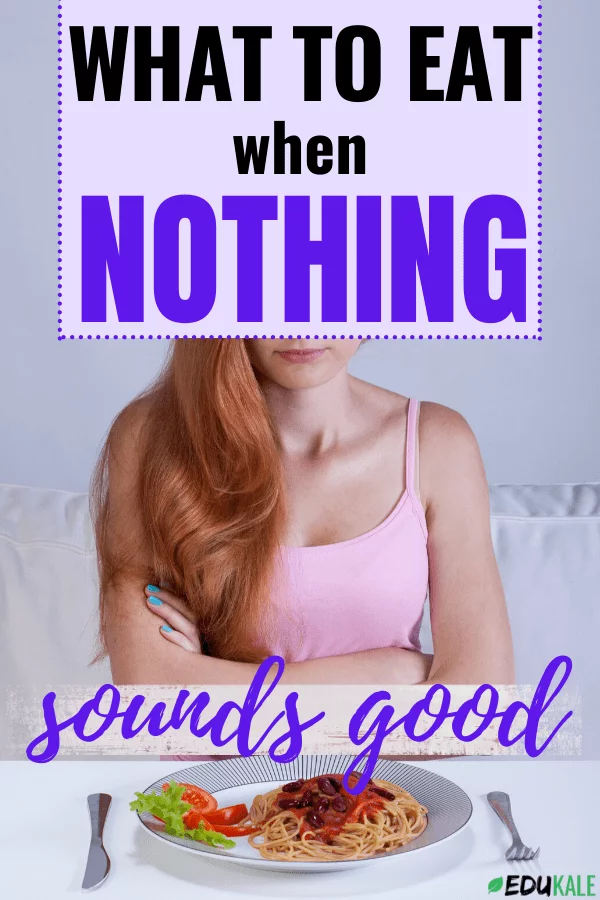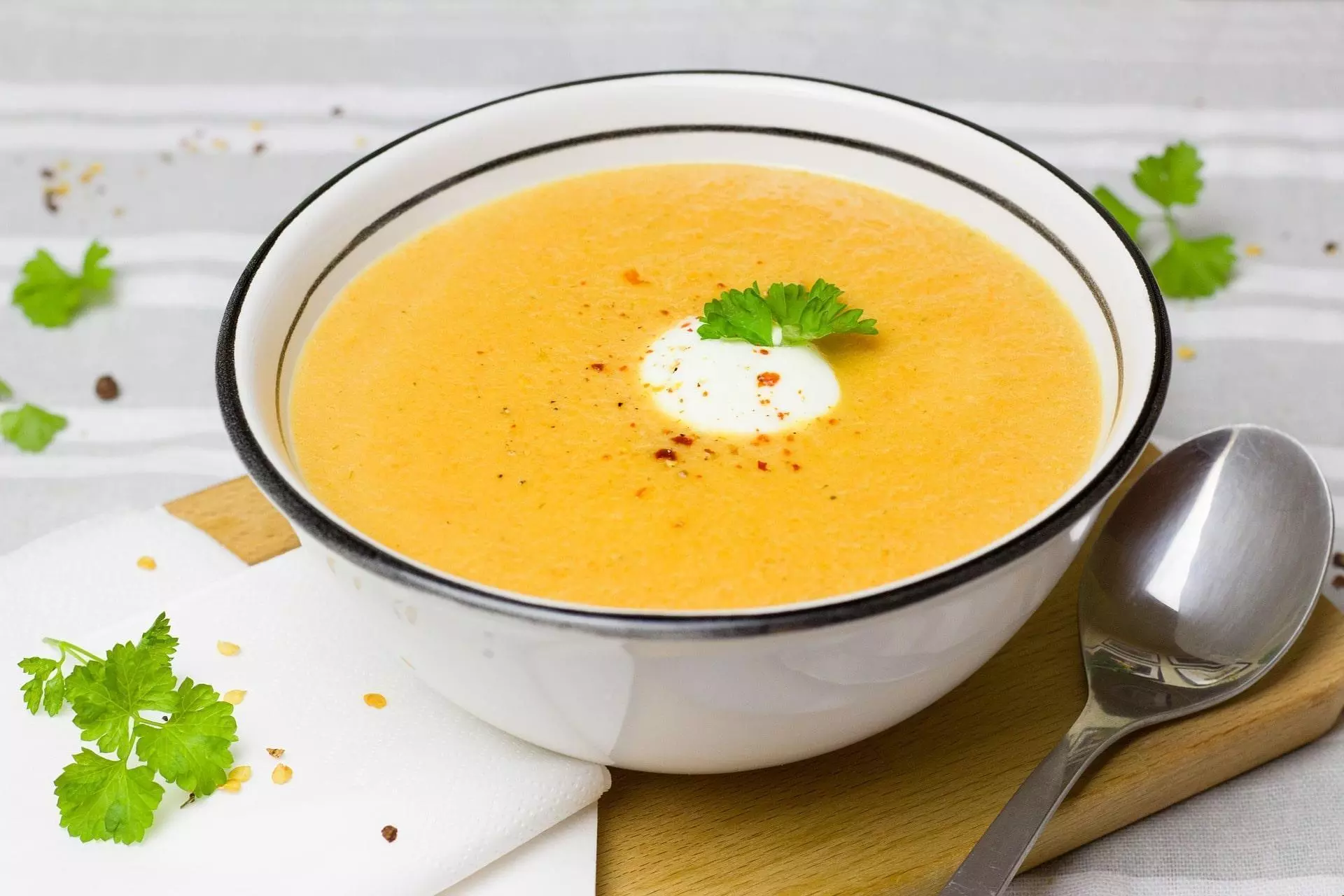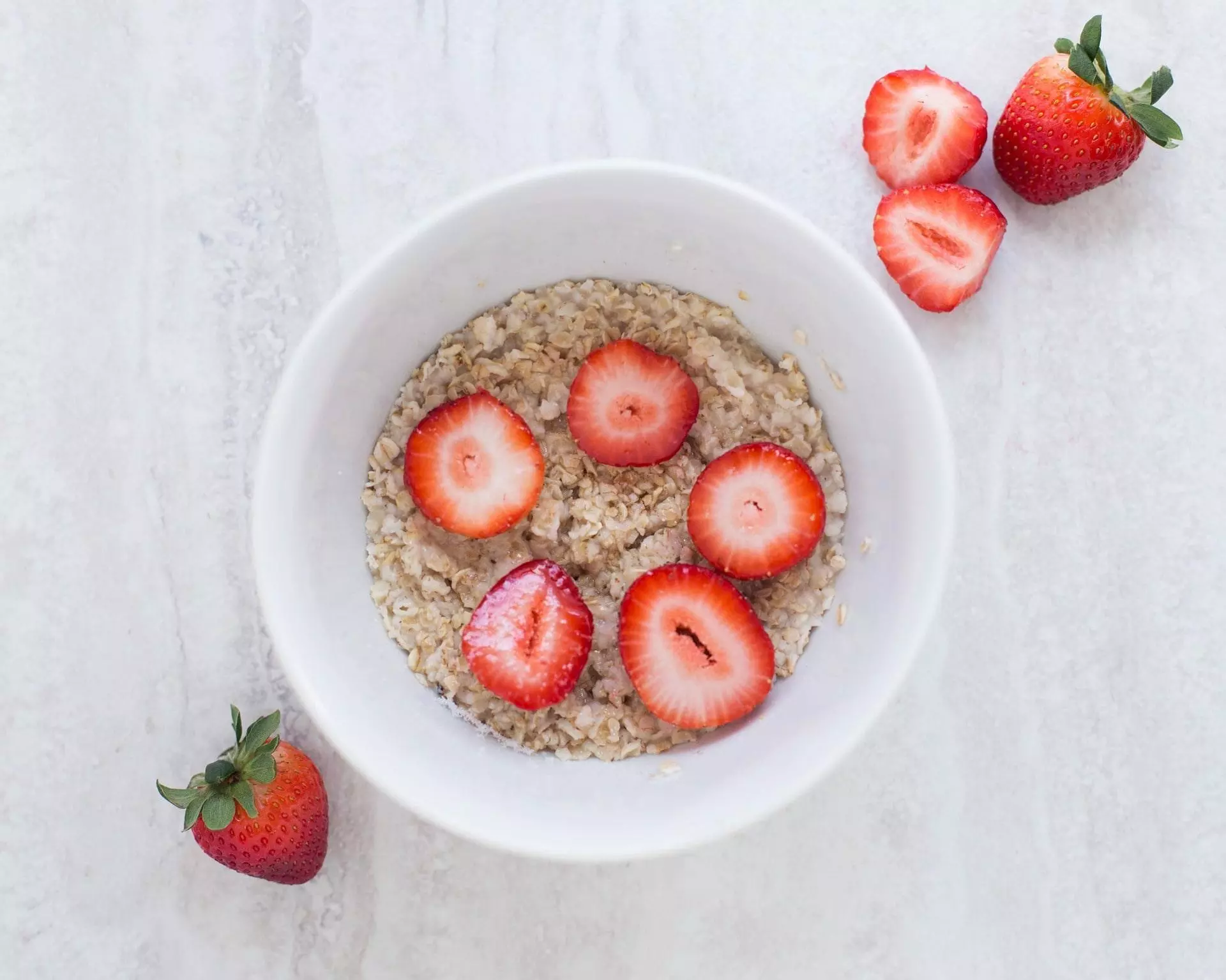This post contains affiliate links from which I may receive a small commission, at no extra cost to you. In no way does this affect my opinion or the information I provide on the product. Please read my disclaimer for more info.
For some people, eating is the highlight of their day.
They love thinking about what they are going to eat, salivate while looking at delicious-looking food pictures, enjoy cooking and prepping their food, and are excited when meal-time approaches.
But for others, none of these things are appealing. They know they have to eat but nothing actually sounds good.
They can’t stand the thought of having to cook and eat food that’s not appealing. Sometimes, they wish they were able to eat a vitamin, meet their needs, and be done with it.
A day like that can happen to any of us, and it’s not fun. So, what should you eat when nothing sounds good?

Should you eat if you’re not hungry?
First of all, it’s possible that nothing sounds good because you’re just not hungry. So should you force yourself to eat something or not?
Well, the answer isn’t black or white. If you’re very in-tune with your hunger cues, understand the basics of nutrition, and are used to eating intuitively or mindfully, then it’s fine to skip a meal or have it later on when you don’t feel hunger.
While having a general meal schedule is important for healthy eating, you shouldn’t force yourself to eat when none of the hunger cues are there.
However, there are some situations where these cues might be clouded by something else.
For instance, if you are anxious or stressed about an upcoming event, this might make it pretty hard to feel hunger. Same thing if you are going through some emotional changes.
Your body still needs nourishment though, and not having food for a while can have some unpleasant consequences. In a case like this, eating even if you aren’t hungry can be important. In addition, if you suffer from/ are recovering from an eating disorder, skipping meals can be triggering and dangerous.
You might also find yourself in a situation where you won’t have access to food for a few hours, or have an imposed lunch-break, so you have to eat now for practical reasons.
So now, you might be wondering:
What should I eat if I have no appetite?
When you’re not hungry but need to eat
I know how difficult it can be to eat forcefully when the hunger signals just aren’t there. I have some pretty vivid memories of trying to get some food down right before an important exam. I knew I had to eat or else I wouldn’t make it through the day, but it felt like I was full right up to my throat.
Here are a few tips to still get some nourishment when this happens:
- Have a smoothie. Smoothies are a great way to get in nutrients when you don’t feel hungry but need to eat. You can put some fruit and spinach along with seeds and nuts for a healthy mix of carbs, fats, and protein. Make sure to add water and blend for a while: thick smoothies are more difficult to eat when you aren’t hungry.

- Or a bowl of soup. Homemade is best of course, but if you’re not feeling it having a ready-made soup is another easy way to get in some nutrition. Similarly to the smoothie, drinking nutrients can be easier than eating them.
- Add some nutritious toppings to your food. If the only things you can stomach are a few leaves of lettuce, for instance, add some seeds, nuts, and nutritional yeast to it for a nutrient boost.
- Have a filling snack. Snacks are often more appealing than actual meals when you aren’t hungry, but you can still get some good nutrition from them. Try spreading a generous amount of peanut butter on bread. Or dipping some apple slices into almond butter. Have a banana with dark chocolate, veggie sticks with hummus, or enjoy some oatmeal with fruit. There are a lot of options!
When you’re hungry but nothing sounds good to eat
Another possible scenario may be that you actually feel hunger, but that nothing sounds good to eat. You might spend a lot of time going through your fridge and pantry only to feel discouraged because it feels like nothing will hit the spot.

In this case, here are a few suggestions:
- First of all, don’t hesitate to try some of the above tips: they may work in this scenario as well!
- Have some easy meal options on hand at all times. Sometimes, the idea of cooking something when it doesn’t even sound that good is enough to stop you from eating. I mean why should you waste time cooking something that you don’t even crave?
A solution to that would be to have some ready-to-go meal options in your fridge. Try to plan your meals (this has benefits!) and even do some meal prep when you can. If it seems too time-consuming for you, try to cook larger portions when you do feel like cooking so that you can have leftovers. You can even freeze them and have them later if you don’t feel like eating the same thing a few days in a row. - Turn to your all-time favorite foods. Everyone has a go-to food that they will never get sick of. For me, it’s pasta! I know that whenever I don’t feel like cooking or nothing seems good enough to eat, I can just have some mac & cheese and be totally fine.
If your favorite food isn’t the healthiest, you can try to have a small portion of it and add some fruit and veggies to the side, for instance. But once in a while, it’s totally fine! - Resort to an easy and healthy meal. If nothing seems to be working but you still need that food, the best option may be to whip up something quick yet nutritious.
You can have canned (they’re much quicker!) beans with brown rice and canned green beans, a tofu or egg omelet with frozen pre-cut veggies, whole-wheat spaghetti with tomatoes and herbs… Even if you don’t particularly enjoy your meal, you can find comfort in knowing that it didn’t take too long to make and that it’s healthy and nutritious for your body.
Accept that you won’t always feel satisfied
It can be frustrating when you eat just to fill yourself up and don’t get any satisfaction from your meal. This may lead to rummaging through the snack pantry in order to find that one thing that will hit the spot. However, that is not the way to go.
While eating to satisfy your physical and emotional needs is crucial, having one unsatisfying meal isn’t a big deal. Not every meal will give you immense pleasure or even hit the spot just right and that’s totally fine.
Acknowledge that honoring practical hunger is also important. In some situations, you have to prioritize fueling your body over the pleasure of your tastebuds. But the good news is, the next meal is only a few hours away, and it’ll be a new chance to have an entirely satisfying meal!

WHAT TO EAT WHEN NOTHING SOUNDS GOOD (IN SHORT!):
Sometimes, you might not feel like eating when mealtime comes around. It might be because you aren’t really hungry, or simply because nothing sounds good to eat. In most cases, it’s still important to eat in order to honor your practical hunger.
Try to have a smoothie, a soup, or a healthy snack in order to sneak in some nutrients without having to go through a full-on meal. Try adding healthy and filling toppings to boost your nutrient intake. Make sure you always have some quick and easy meal options on hand so you can spend less time cooking (leftovers are awesome!), and don’t hesitate to turn to your all-time favorite comfort food if you can’t stomach the thought of anything else.
PS: if you feel like you have the opposite problem and find yourself eating simply out of boredom, check out this article on how to prevent boredom eating!
-Lucie
If you’re interested in nutrition, its impact on our health, and the science behind it, you should definitely read How Not to Die. In this book, Doctor Michael Greger, founder of Nutrition Facts, examines the top causes of death in America and explains how your diet can prevent— and in some cases even reverse— them. His advice is all backed by science and he writes in a very clear and entertaining way. This book isn’t a list of what you already know. It will teach you the keys to living a long healthy life, in a simple and practical way, and without spending fortunes on supplements and pills!
PLUS if you want to take it a step further, you can check out the How Not to Die Cookbook to implement the advice easily!



Comments are closed.